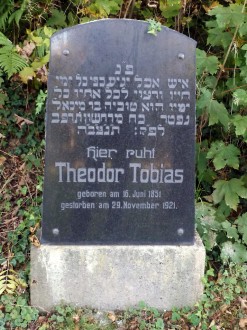Michael Tobias was the second son of Tobias Herz and Täubchen Samuel. He was born in Oberdreis about 1802. In the 1811 census he appears as Eisik (Isaac). On August 12, 1846 he married Esther Kronenthal, daughter of Joseph Moses Kronenthal and Johanna David. Esther was born on February 2, 1824 at Wienau, Dierdorf. She had five sisters and one brother. Her father worked as a butcher and peddler in Wienau. Esther’s paternal grandparents were Joseph Moses (born 1743) and Gudel Rubin (1753-1837).

Esther was 22 years younger than her husband Michael, who was already 44 years old when he married her. We have records of 5 children they had together: Johanna was born in 1847, but there are no further traces of her. Julie “Julchen” was born on March 1, 1849 and married Joseph Cahn of Bornheim. Tobias “Theodor” Tobias was born on June 16, 1851. He married Johanna Levy and worked as a butcher in Oberwambach and Altenkirchen. Moses was born on January 24, 1854 in Niederwambach. He married Jettchen Oestreich of Langstadt, Babenhausen and moved to Heimbach-Weis, Neuwied, where he ran a butcher shop. The youngest son Simon, a trader, was born in 1857 and died in Hamburg in 1921. He married the widow Rosa Rothschild, nee Dannebaum from Hofgeismar. They had one son Siegfried „Fritz“ Tobias, born on August 16, 1887 at Hofgeismar, who became a physician and married Paula Sussmann of Hamburg, one of the first female physicians in Germany. In November 1935 they emigrated to California with their son Gerd.
When Michael Tobias, who earned his living as a cattle dealer and farmer in Niederwambach, died in 1858 at the age of 56, his young widow Esther was only 34 years old. Albert Hardt reported in his article about the Jews of Puderbach, an incident that took place in 1864:
Esther had to take care of 5 children and her eldest son, who didn’t learn anything from the prayer leader of Puderbach, so she sent him to the teacher in Dierdorf. He had agreed to teach the boy for 12 1/2 silver pennies per month. The school board of Dierdorf, however, expelled her brother-in-law from the synagogue until he paid the school fee for the boy. Another note about that issue stated that Josef Kronenthal took his grandson to live with him at Dierdorf, but he didn’t want to pay 20 silver pennies extra per quarter of a year above the appointed monthly fee. The congregation even stripped him off his parish rights. He then paid the 20 pennies, but sent his grandson back to his mother, although he was able to afford the claimed tuition.

It remains unclear who this eldest son, resp. the sixth child was. Tobias Tobias was 13 years old in 1864, so this was an age Esther probably would have wanted her son to be prepared for his Bar Mitzwah. Her brother-in-law of Dierdorf isn’t mentioned by name. Maybe it was Isaak Levy, the husband of her sister Henriette who lived in Urbach. It doesn’t become clear either why Joseph was so unwilling to pay the school fee. We know the congregation of Dierdorf suffered financially by the fact that the Puderbach Jews tried to back out of all common obligations since 1847. Especially the teachers had a hard time trying to make ends meet with such meager wages.
Esther lived with her son Tobias “Theodor” in Oberwambach until her death on August 28, 1899. She was the fourth and the last person buried in the old Jewish cemetery of Altenkirchen. The new cemetery was established in 1900 as an extension of the older one. After the war, the property of the old cemetery was sold by its new owners, the Jewish religious community of Neuwied. The circumstances of this disposal remain mysteriously, because the acquiring party used the grounds as a building plot and this runs contrary to the Jewish principle of eternal rest. We don’t know what happened to the old gravestones. Maybe they already were destroyed during the Nazi era and therefore the community of Neuwied decided to sell the land.
Stammbaum:
Generation 1
- Michael Tobias (1802-1858) ∞ Esther Kronenthal (1824-1899) Niederwambach/Puderbach
Generation 2
- Tobias Herz (1758-1833) ∞ Täubchen Samuel (1774-1860) Oberdreis
- Joseph Moses Kronenthal (1795-1865) ∞ Johanna David (1796-1865) Dierdorf
Generation 3
- unknown
- unknown
- Joseph Moses (1743-?) ∞ Gudel Rubin (1753-1837)
- unknown
